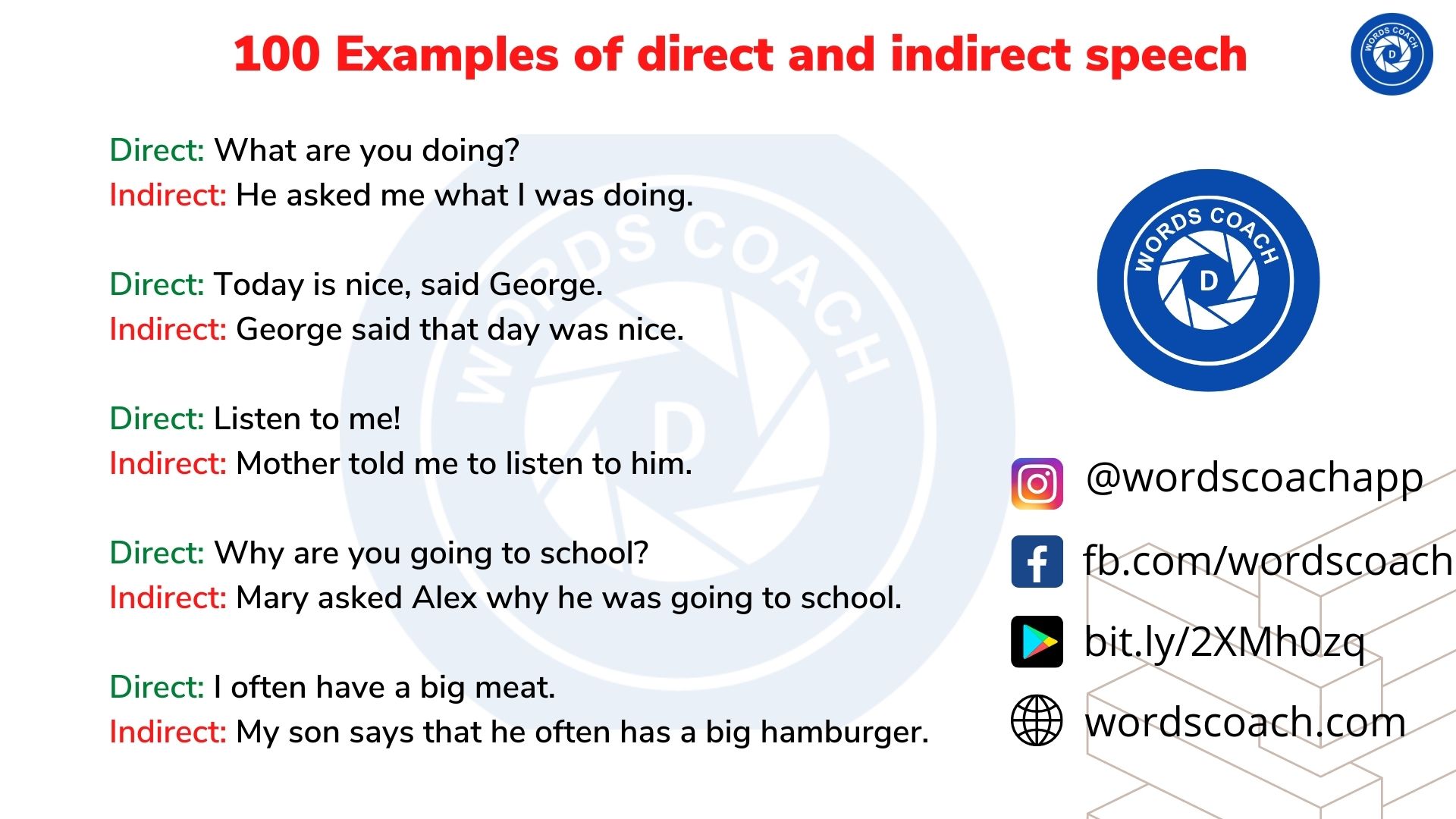Examples of direct and indirect speech
Direct Speech:- Direct speech is a report of the exact words used by a speaker or writer. Direct speech is usually placed inside quotation marks and accompanied by a reporting verb, signal phrase, or quotative frame.
Indirect Speech:- Transferring the sentence that someone else says is called indirect speech. It is also called reported speech.
Direct and Indirect Speech Exercises
100+ Examples of direct and indirect speech
Direct: What are you doing?
Indirect: He asked me what I was doing.
Direct: Today is nice, said George.
Indirect: George said that day was nice.
Direct: Listen to me!
Indirect: Mother told me to listen to him.
Direct: She said, “I went to the shopping center.”
Indirect: She said that she had gone to the shopping center.
Direct: Why are you going to school?
Indirect: Mary asked Alex why he was going to school.
Direct: I often have a big meat.
Indirect: My son says that he often has a big hamburger.
Direct: He said, “I will wash my teeth”.
Indirect: He said he would wash his teeth.
Direct: He said, “I live in the city center.”
Indirect: He said he lived in the city center.
Direct: The butcher told us, “We are closing at 7 o’clock.”
Indirect: The butcher told us that we were closing at 7 o’clock.
Direct: He asked her, “How often do you work?”
Indirect: He asked her how often she worked.
Direct: I don’t understand you.
Indirect: Teacher said that he didn’t understand me.
Direct: He works in a bank.
Indirect: She said that he worked in a bank.
Direct: He said “I had lived in Paris.”
Indirect: He said that she had lived in Paris.
Direct: Must I do the city?
Indirect: My sister asked if she had to do the city.
Direct: He said, “I can swim.”
Indirect: He said he could swim.
Direct: I’m angry with you.
Indirect: My mother said she was angry with me.
Direct: My father is helping me study.
Indirect: He said his father was helping his study.
Direct: I didn’t go to the party.
Indirect: Alex said that he hadn’t gone to the party.
Direct: Dance with me!
Indirect: Maria told me to dance with her.
Direct: I can help you tomorrow.
Indirect: She said that she could help me tomorrow.
Direct: Michael asked Tom, “Are you married?”
Indirect: Michael asked Tom whether she was married.
Direct: Please wash your hands!
Indirect: My father told me to wash my hands.
Direct: Don’t smoke!
Indirect: The teacher told us not to smoke.
Direct: I write poems.
Indirect: He says that he writes poems.
Direct: She said: “I would buy new house if I were rich”.
Indirect: She said that she would buy new house if she had been rich”.
Direct: May I go out?
Indirect: She wanted to know if she might go out.
Direct: She is American, she said.
Indirect: She said she was American.
Direct: My son, do the exercise.“
Indirect: She told her son to do the exercise.
Direct: I don’t know what to do.
Indirect: Samuel added that he didn’t know what to do.
Direct: I am reading a book, he explained.
Indirect: He explained that he was reading a book.
Direct: My father said, “I am cooking dinner.”
Indirect: My father said he was cooking dinner.
Direct: I said, “He is driving a car”
Indirect: I said that he was driving a car.
Direct: I am a doctor he said.
Indirect: He said he was a doctor.
Direct: My sister said, “I had already eaten.”
Indirect: My sister said she had already eaten.
Direct: I could swim when I was four.
Indirect: He said he could swim when he was four.
Direct: George is said, “I write a letter”.
Indirect: George is said that she wrote a letter.
Direct: I should call my mother.
Indirect: He said he should call her mother.
Direct: I like ice cream.
Indirect: He said that he liked ice cream.
Direct: Michael said, “I may go there.’
Indirect: Michael says that she may go there.
Direct: I’II see you later.
Indirect: He said he would see me later.
Direct: My boyfriend asked, “Do you like horror films?”
Indirect: Do you like horror films? my boyfriend asked.
Direct: I might be late.
Indirect: He said he might be late.
Direct: We can´t go the zoo next week.
Indirect: They said they couldn’t go to the zoo next week.
Direct: I never get up late, my mother said.
Indirect: My mother said that she never got up late.
Direct: He said, “I was teaching earlier.”
Indirect: He said he had been teaching earlier.
Direct: Mary said, “I have been writing this essay.”
Indirect: Mary said that he had been writing that essay.
Direct: I could swim when I was five.
Indirect: My girl friend said (that) she could swim when she was five.
Direct: She said, “I might come early.”
Indirect: She said she might come early.
Direct: Michael was ill.
Indirect: Michael’s father said (that) Michael had been ill.
Direct: I am leaving home now.”
Indirect: He said that he left home then.
Direct: Are you living here?
Indirect: He asked me if I was living here.
Direct: I’m going to come.
Indirect: She said that she was going to come.
Direct: We can communicate smoothly.
Indirect: They said that they could communicate smothly.
Direct: My mother isn’t very well.
Indirect: She said that her mother wasn’t very well.
Direct: I need help with my work.
Indirect: George said “I need help with my homework.”
Direct: I was walking along the Street.
Indirect: He said he had been walking along the Street.
Direct: I haven’t seen George recently.
Indirect: She said that she hadn’t seen George recently.
Direct: I would help, but…
Indirect: He said he would help but…
Direct: I’m waiting for Michael, she said.
Indirect: She said (that) she was waiting for Michael”.
Direct: My parents are very well.
Indirect: Alex said that his parents were very well.
Direct: I bought a car.
Indirect: He said he bought a car.
Direct: They said, “They have taken exercise.”
Indirect: They said that they had taken exercise.
Direct: I am living in Paris.
Indirect: He said that he was living in Paris.
Direct: Please don’t be late.
Indirect: He asked their not to be late.
Direct: She said; “The exam is difficult.
Indirect: She said the test was difficult.
Direct: I can speak perfect Spanish.
Indirect: He said he could speak perfect Spanish.
Direct: I haven’t seen Mary.
Indirect: He said he hadn’t seen Mary.
Direct: What is your name? she asked me.
Indirect: She asked me what my name was.
Direct: I was sleeping when Mary called.
Indirect: He said that he had been sleeping when Mary called.
Direct: Please help me!
Indirect: He asked me to help his.
Direct: I’m living in Texas now.
Indirect: Her father said that he was living in London now.
Direct: “I’ve found a new job,” my mother said.
Indirect: My mother said that she had found a new job.
Direct: Go to bed! mother said to the children.
Indirect: Mother told the children to go to bed.
Direct: Mark arrived on Sunday, he said.
Indirect: He said that Mark had arrived on Sunday.
Direct: I will study”, Mary said.
Indirect: I will study”, said Mary.
Direct: The Minister said, “There will be no growth this year.”
Indirect: The Minister said that there will be no growth this year.
Direct: I have been to France, she told me.
Indirect: She told me that she had been to France.
Direct: She says, “I am ill.”
Indirect: She says that she is ill.

Direct: Michael said, “I have finished my lunch.”
Indirect: She said that she had finished his lunch.
Direct: I’m sitting on the chair.
Indirect: Arya said that she was sitting on the chair.
Direct: My brother said, “I met Alex yesterday.’
Indirect: My brother said that he had met Alex yesterday.
Direct: The dentist said, “Your father doesn’t need an operation.”
Indirect: Dentist said that my father doesn’t need an operation.
Direct: He said, “Man is mortal.”
Indirect: He said that man is mortal.
Direct: He said, “I like coffee.”
Indirect: He said (that) he likes coffee.
Direct: Sansa said “I am very busy now”.
Indirect: Sansa said that she was very busy then.
Direct: Everything is going fine.
Indirect: The news says that everything is going fine.
Direct: I had taken Spanish lessons before.
Indirect: He said he had taken Spanish lessons before.
Direct: Come at 11!
Indirect: Alex told me to come at 11.
Direct: He said, “I am a football player.”
Indirect: He said that he was a football player.
Direct: My father was born in 1962.
Indirect: My father told us that he was born in 1962.
Direct: It is too late.
Indirect: I said it was too late.
Direct: Did you do your homework?
Indirect: He asked me if I did (had done) my homework.
Direct: I often enjoy myself.
Indirect: Mary will say that that she often enjoys herself.
Direct: He said, “he is listening to the music”
Indirect: He said that he was listening to the music.
Direct: She said, “I’ve missed my train.”
Indirect: She said that she’d missed her train.
Direct: Please help me carry this!
Indirect: My mother asked me to help her carry that.
Direct: Michael said, “I will buy a new car.”
Indirect: Michael said that she will buy a new car.
Direct: Mercedes is a good car.
Indirect: Tom said Mercedes was a good car.
Direct: I’m sorry for the accident.
Indirect: Georger told Samuel (that) he was sorry for the accident.
Direct: Mark said, “Bill needs a pencil.”
Indirect: Mark said that Bill needed a pencil.
Download Words Coach Application
Read More:






